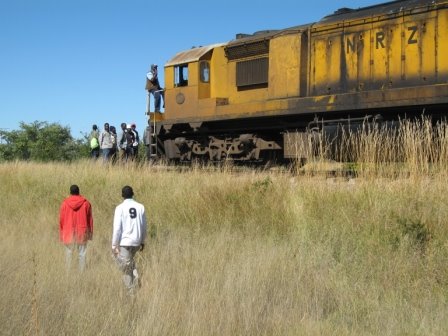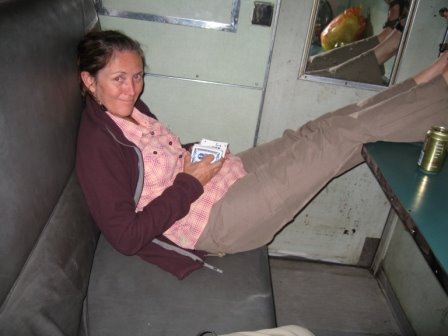We promised you no more bus stories, so this is a story about the train trip that we took in the last 24 hours…
We wanted to travel from Victoria Falls to Bulawayo, both on the western side of Zimbabwe. The options were a five hour bus trip leaving at 4 AM from somewhere out of town, or an overnight train leaving at 7PM from the train station only five minutes walk from our guesthouse. We asked several local people about the train, and they confirmed that it was safe, despite our guidebook’s comment that accidents are common. We chose the train because of the ease of access, better departure time, avoidance of the cost of one night’s accommodation, and the positive experience we’d had on the overnight train in Tanzania. The train trip was scheduled to take 14 hours, and to arrive at 9 AM in Bulawayo.
We arrived at the train station just before dark, and waited until the list was posted showing which people were assigned to which saloon (i.e. car) and compartment. We were assigned to saloon 1121 compartment C, which a 1st class ‘coupe’, a sleeping compartment for two people only. It sounded wonderful.
When we boarded the train, we found that almost all the lights in the car were not functioning. The passageway was completely dark, making it difficult to find out compartment. Our compartment was one of only two that had lights, while the other 1st class passengers sat in complete darkness. Our compartment had an intermittent smell of smoke and urine. The lower bench, where we both sat and Diane slept, was missing much of its upholstery, so dirty foam was visible instead. Above the upper bunk was a small storage compartment which we closed after discovering that it contained bones, hopefully from a previous passenger’s dinner and not from a previous passenger. There was a small medicine cabinet above what was once a fold down sink, both of which we were afraid to open. Patrick opened them and looked anyway.
The two African men in coupe D had no lights, and we struck up a conversation with one of them. He was a businessman from Zambia, with good English and a laid back attitude. He was traveling in Zimbabwe as part of his work in import/export (i.e. smuggling). Apparently cooking oil is much cheaper in Zimbabwe than in Zambia due to the fact it can be obtained from South Africa duty-free. By purchasing it in bulk in Zimbabwe, and then smuggling it into Zambia without paying duties, he makes a tidy profit.
There were signs posted on the train like ‘Preserve your Heritage, Don’t Damage the Trains” and “No Smoking”. Our chain-smoking conductor came by to check our tickets. In 1st class, they normally provide sheets, blankets, and pillows to passengers, then rent any extra ones to those in second class for $1 US per person. On our trip, they had no sheets, but we were given two blankets and a pillow each. We used our own sleeping sheets and the blankets, which were just warm enough when the temperature dropped significantly at night.
You could tell that our National Railway of Zimbabwe (NRZ) train was, in colonial times, a beautiful thing, but it has seen better days. In 1st class, in addition to no lights and sparse upholstery, the cars were also lacking many pieces of window glass, all the door handles, and any form of maintenance or cleaning. Our compartment and the passageway were dirty. The toilets had no seats, no longer flushed, and like other trains in Africa, were basically just a hole opening down through the floor onto the tracks. There was no running water in the bathrooms, but there was a sign asking people not to occupy the bathroom for more than 10 minutes, which was not necessary in our case, as we tried to get out of there as quickly as possible, without touching anything.
In the morning, Patrick walked down a few cars to check out 3rd Class. Between the cars, all the doors were missing. In 1st class, the doors to the exterior did not shut (due to the missing door handles), but in 3rd class, they were completely gone. The ground rushed by outside, and the wind poured into the cars. In 3rd class, in addition to the missing doors, there were was no glass in any of the windows. The passengers were huddled on benches under blankets, wearing toques and gloves trying to stay warm as the wind blasted through the cars. This was definitely not a pleasant way to travel, especially when you’re not used to the cold. 3rd Class costs $5 US per person and 1st Class costs $8.
The train was running late, and we were expecting to arrive around 10 AM, when the train stopped unexpectedly on the outskirts of Bulawayo. The conductor wandered by to let us know that the train had run out of petrol. What? Lawnmowers run out of gas. Gas barbeques run out of gas. Occasionally, Patrick’s car runs out of gas. But trains do not run out of gas. Or at least they shouldn’t.

People started to disembark from the train, and stood beside the tracks in the tall grass. Patrick walked the length of the train, up one side and down the other, seeking information on what was happening. A group of male passengers were crowded around the engine at the front of the train. One said that another engine was being sent to retrieve us. Many of the passengers who could had already started to walk. We were apparently about 30 minutes hike from the second-to-last station before our destination. From there, it would likely be possible to get some form of transport to the end. When Patrick reported this to Diane, she was not pleased. We were getting ready to start hiking when we heard that the rescue engine would likely arrive in 15 more minutes. After about 90 minutes of waiting, the train started moving again, and we made it to Bulawayo at about 1 PM, only 4 hours late!

